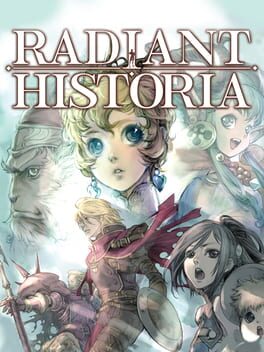Radiant Historia, co-produced by Atlus & Headlock (not to be confused with 2005's Radiata Stories, which - incidentally, shares some of the same developers), is a lengthy work characterized by two brilliant ideas. The first of which is their battle system, a sort of 'flipped' version of row-based combat, where the opponent's damage output is determined by their placement on a 3x3 grid. Expanding on that are skills with knockback effects (to keep foes from reaching the frontline) and sequential attacks (enabled via turn orders), two mechanics that often work in tandem. There are faint echoes of Battle Network (in layout) and tactics games proper (the focus on positioning, as displayed by Wild Arms 4's notion of striking/trapping multiple units on the same tile) as well as of more complex JRPGs (turn order list + manipulation, although with a strictly turn-based, combo-minded approach that's more Persona 2 than Grandia). But the resulting gameplay has no precedent - at least within its genre: Brief fights centered on gathering & dispatching foes in one fell swoop.
The second and even more adventurous highlight is the White Chronicle, a form of level selection that recasts branching story paths as a means to collect side quests, Zelda-ian tools and loot, helped out by time-travel points and complete with numerous end states. Further down the narrative are various roadblocks (across both main & side quests) that require one to jump backwards, forwards or between timelines and manipulate events to make progress. This system - and its dense cauldron of 'temporal' unlocks, established them as worthy successors to the Chrono series. The rest - on the other hand, pales in comparison, and frequently dilutes the show. Their more political approach to drama lacks memorable characters & moments, hardly redeemed by long-winded cutscenes (that spend too much time on small talk, enunciating the rules or even spoiling the following task's solution), while its dungeons and unit progression (i.e. old fashioned level/item-based skill learning) feel like placeholders for more creative systems that didn't materialize in time.
The second and even more adventurous highlight is the White Chronicle, a form of level selection that recasts branching story paths as a means to collect side quests, Zelda-ian tools and loot, helped out by time-travel points and complete with numerous end states. Further down the narrative are various roadblocks (across both main & side quests) that require one to jump backwards, forwards or between timelines and manipulate events to make progress. This system - and its dense cauldron of 'temporal' unlocks, established them as worthy successors to the Chrono series. The rest - on the other hand, pales in comparison, and frequently dilutes the show. Their more political approach to drama lacks memorable characters & moments, hardly redeemed by long-winded cutscenes (that spend too much time on small talk, enunciating the rules or even spoiling the following task's solution), while its dungeons and unit progression (i.e. old fashioned level/item-based skill learning) feel like placeholders for more creative systems that didn't materialize in time.
